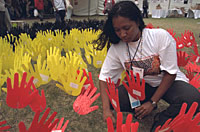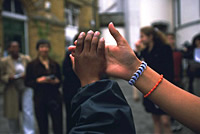Featured Update
Venue and duration of 2009 anti-racism review conference to be decided on 26 May
A two-week meeting of the Preparatory Committee for the review conference on racism, racial discrimination, xenophobia, and related intolerance ended in Geneva on 2 May after agreeing to to postpone decisions on where to hold the review conference, although it is likely to be in one of the four UN centres of Geneva, Nairobi, New York or Vienna.

“An indigenous Australian adolescent girl plants painted hand cut-outs in the ground, during the 2001 conference -UNICEF/HQ01-0330/Giacomo Pirozzi"
The precise duration of the conference was also not decided, with some states wanting it to last for three days and others wanting five. There was general consensus that the conference would probably take place in June 2009.
A special extension of the latest Preparatory Committee (PrepCom) session, on 26 May, will decide the outstanding issues.
The PrepCom – which is open to all UN member states – was holding its first substantive meeting in the run-up to the review conference and reached agreement on a number of fundamental issues including the process involved in drafting the review conference’s outcome document. An intergovernmental working group, that will hold its first session on 26-30 May, will begin negotiations on the content of the outcome document.
Decisions on the accreditation of non-governmental organizations (NGOs) for the review conference were also made. Hundreds of NGOs which already have consultative status with the UN’s Economic and Social Council (ECOSOC) are automatically entitled to take part in the process; as are over a thousand others which participated in the original 2001 World Conference Against Racism, Racial Discrimination, Xenophobia and Related Intolerance, providing no government objects and the objection is not upheld by the PrepCom. NGOs that do not belong to either of these existing groups were subjected to an individual examination by the PrepCom.
In all, the credentials of 47 NGOs, based in eight different countries, were discussed. Seven were accredited, one was excluded, one withdrew, 37 were provisionally accepted or else not finally rejected, and in one case a decision is still pending.
Only one – an NGO from Bhutan that failed to provided additional information requested by the Bhutanese Government – was formally excluded from the remainder of the process because there were insufficient grounds to decide whether it had the required competence and if its activities were sufficiently relevant to the work of the PrepCom. The decision was adopted by consensus, without a vote.
Four other NGOs were accredited without any objection or debate. These were the Community Security Trust, registered in the U.K; the Foundation Against Racism and Anti-Semitism (Switzerland); the Mouvement International pour les Reparations (France); and the Palestinian Grassroots Anti-Apartheid Wall Campaign (Occupied Palestinian Territories).
Another NGO, the Canadian Council for Israel and Jewish Advocacy (CCIJA), withdrew its application during the second week of the PrepCom after the Islamic Republic of Iran made several requests for additional information, some of which was provided. Although there was heated debate over this issue, a formal decision by the PrepCom on whether or not to accredit the CCIJA was in the end precluded by the group’s decision to withdraw.
 "Two children slap hands in a 'high-five' in support of 'Say Yes for Children', following the international launch in London,UK -UNICEF/Justin Leighton"
"Two children slap hands in a 'high-five' in support of 'Say Yes for Children', following the international launch in London,UK -UNICEF/Justin Leighton"India requested additional information on 40 NGOs. Of these 33 failed to respond to a questionnaire, and the PrepCom decided that, although they would not be permitted to attend this session, they could still attend the next one and the final review conference, if they subsequently provide sufficient information to satisfy ECOSOC requirements.
Additional information on two Congolese NGOs was requested, but not provided. However, the requesting country, the Republic of Congo, did not pursue the matter any further.
One NGO, called India Peace Centre, was accredited after it supplied two sets of requested information. Of the remaining six Indian NGOs, three were accepted without the provision of further information, and three others that partially satisfied requests for further information were provisionally invited to take part in the PrepCom process, providing they subsequently provide the rest of the information required.
The purpose of the review conference, which was reaffirmed by the PrepCom, is to review progress and assess implementation – at national, regional and international levels – of the Declaration and Plan of Action adopted by the 2001 World Conference Against Racism, Racial Discrimination, Xenophobia and Related Intolerance. The review process will, in addition, identify concrete measures and initiatives for combating and eliminating these phenomena. It will also assess the effectiveness of the existing follow-up systems and other relevant UN mechanisms, promote universal ratification and implementation of the Convention on the Elimination of All Forms of Racial Discrimination, and identify and share good practices.
The Preparatory Committee is expected to hold a second and final substantive session towards the end of the year, although not necessarily in October as originally envisaged.
Four regional sessions will also be held, with the first scheduled to take place in Brasilia from 17-19 June 2008.
The original World Conference Against Racism, Racial Discrimination, Xenophobia and Related Intolerance was held in Durban, South Africa, from 31 August to 8 September 2001. The decision to hold a review conference some time in 2009 was laid down in a 2006 UN General Assembly Resolution.
May 2008
Top